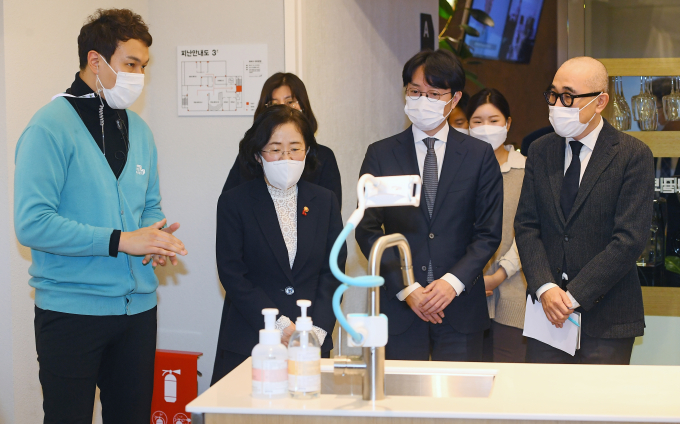Antitrust regulations
Seoul to lower bar for M&As; easing rules over PEF deals
By Jan 24, 2021 (Gmt+09:00)
3
Min read
Most Read
Samsung shifts to emergency mode with 6-day work week for executives


CJ CheilJedang to sell feed, livestock unit for $1.4 bn


Samsung Electronics' key M&A man returns; big deals in the offing


Affinity to buy SK Rent-a-Car at $572 mn, more deals expected


Keppel REIT to sell Seoul-based prime office T Tower



South KoreaŌĆÖs Fair Trade Commission (FTC) is lowering the bar for mergers and acquisitions by including potential rivals, which have yet to enter the market, in the allowed group of competitors for antitrust reviews, a move expected to smooth the way for bigger playersŌĆÖ tie-ups.
As part of the relaxed rules, the antitrust body will also loosen scrutiny over acquisitions by private equity firms, believing them to be less likely to hinder market competition, FTC said on Jan. 22.
ŌĆ£We will revise our standards for M&A reviews by including potential rivals, which are highly likely to enter the market, in the group of allowed competitors,ŌĆØ FTC said in a report of its key 2021 policy tasks to be presented to President Moon Jae-in.
ŌĆ£M&A barriers will be lowered for the information and communications technology industry where large platform companies are able to enter the market at all times and the existing No. 1 players can be replaced at any time.ŌĆØ
At the same time, it will tighten scrutiny over online platform operators to prevent their abuse of market power. In particular, new laws will be enacted to specify their anti-market activities during the first half of this year and to ban them from acquiring rival companies in an aim to increase market dominance. Additionally, online platform firms, including Naver Corp. and Coupang Corp., will face double penalties if they are found to abuse their market power.
The regulatory moves come after the antitrust body last year instructed GermanyŌĆÖs Delivery Hero SE to divest of a big chunk of its existing South Korean operation as a condition to absorb South KoreaŌĆÖs top food delivery app Woowa Brothers Corp., an operator of Baedal Minjok, or Baemin.
The main reason behind the conditional approval for Delivery HeroŌĆÖs $4.3 billion deal was the 95% market share the combined entity is estimated to command. Under the current Korean antitrust law, a merger proposal is rejected if their combined market share tops 50%, unless the acquired company is in financial distress.

At the time, Delivery HeroŌĆÖs lawyers disputed the number, arguing that South KoreaŌĆÖs top Internet portal Naver Corp. should be counted as one of the competitors in the food delivery market and then the combined entityŌĆÖs market share would fall short of the 95%. But the FTC dismissed the argument. Delivery Hero needs to complete the sale of South KoreaŌĆÖs No.2 food delivery app Yogiyo within a year to avoid heavy penalties.
Last year, Naver acquired JapanŌĆÖs top food delivery platform Demae-Can for around $300 million.
LOOSENS REGULATIONS OVER PRIVATE EQUITY FIRMS
Under the revised laws, PEFs will no longer be categorized as large business groups, meaning they are not required to report their M&A deals to the antitrust body, if the deals are made for the purpose of investment.
But FTC will separate PEFs from PEF-focused groups which have a non-financial entity under the ownership of its head. PEF-focused groups will remain bound by the disclosure rules. As an example, Korea Investment Holdings will be classified as a PEF entity and exempted from the public disclosure requirement. In contrast, IMM Investment, which runs a non-financial unit under the control of its CEO, will be categorized as a PEF-focused entity.
Further, FTC will remove the disclosure requirements for PEF establishment aimed at fundraising, as well as for startup investments, which end up with the investor having fewer than a third of the board seats in the company it invests in.
For the airline, shipbuilding and machinery industries which the FTC expects to undergo shake-ups, it will speed up M&A reviews, and also facilitate consolidation in the broadcasting, communications and semiconductor sectors where M&A activities are likely to accelerate amid the contactless trend.
Regarding large conglomerates, FTC will take a tighter approach to intragroup transactions, in particular in the catering and food and beverage sectors, it added.
Write to Ji-Hoon Lee and Kyung-Mok Noh at lizi@hankyung.com
Yeonhee Kim edited this article.
More to Read
-
 M&AsDelivery Hero could face up to $1.4 bn in fines if it fails to sell Yogiyo
M&AsDelivery Hero could face up to $1.4 bn in fines if it fails to sell YogiyoJan 18, 2021 (Gmt+09:00)
2 Min read -

-
 Merger reviewsDelivery Hero, Woowa $4 bn merger faces hiccup due to KFTC
Merger reviewsDelivery Hero, Woowa $4 bn merger faces hiccup due to KFTCNov 16, 2020 (Gmt+09:00)
3 Min read
Comment 0
LOG IN


